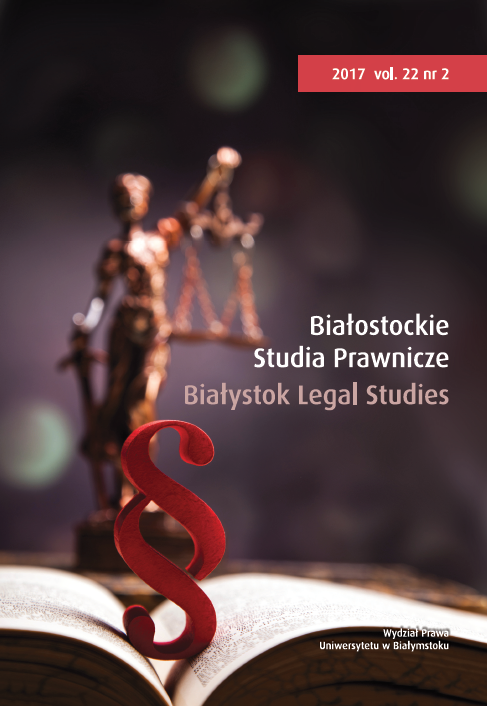Current problems of Preimplantation Genetic Diagnosis in the Context of Parental Aspirations
Abstrakt
Preimplantation genetic diagnosis (PGD) is designed to assist in conception when a serious hereditary disease affects a couple and it is necessary to screen out embryos carrying chromosomal orgenetic abnormalities. The procedure may therefore be lawfully applied only for medical reasons to avoid a particular risk of transmitting genetic defects to a child regardless if the couple is infertile or not. In practice, PGD raises many ethical objections as a method which – as the doctrine says – commodifies reproduction and enables unwanted practice of positive eugenics (a selection of embryos of a particular sex or carrying certain qualities, let alone particular defects (deafness, blindness, etc.). Parents may be prone to choose the features of their future child and decide, by means of PGD, to have a baby of a certain sex, genetic make-up, or to conceive a tissue match for a living sibling. The legislator should therefore intervene, establish the normative framework for the practice of PGD, and keep continuous control over its application to prevent the abuse of the child’s welfare.Bibliografia
Bal J., Wiszniewski W., Wiszniewska J., Diagnostyka molekularna, (in:) J. Bal (ed.), Biologia molekularna w medycynie. Elementy genetyki klinicznej, Warszawa 2006.
Bączyk-Rozwadowska K., Prawo pacjenta do informacji w świetle uregulowań polskiego prawa medycznego, “Studia Iuridica Toruniensia” 2012, No. 1.
Brazier M., Cave E., Medicine, Patients and the Law, London 2011.
Dute J., European Court of Human Rights. ECHR 2013/9 Case of Costa and Pavan vs Italy, 28 August 2012, No. 54270/10 (Second Section), “European Journal of Health Law” 2013, No. 3 (vol. 20).
Gałązka M., Prawo francuskie wobec embrionu in vitro, “Państwo i Prawo” 2000, No. 6.
Haberko J., Ustawa o leczeniu niepłodności. Komentarz, Warszawa 2016.
Herring J., Medical Law and Ethics, Oxford 2012. “House of Commons, Science and Technology Committee”, Human Reproductive Technologies and the Law: Fifth Report of Session 2004-
2005. Volume 1, Issue I, London 2005
Jackson E., Medical Law. Text, Cases, Materials, Oxford 2006.
Jackson E., Regulating Reproduction. Law, Technology and Autonomy, Oxford 2001.
Jasudowicz T., Europejskie standardy bioetyczne. Wybór materiałów, Toruń 1998.
Kapelańska-Pręgowska J., Zjednoczone Królestwo i Republika Włoska – dwa bieguny diagnostyki preimplantacyjnej, (in:) L. Bosek, M. Królikowski (eds.), Współczesne wyzwania bioetyczne,
Warszawa 2010.
Karczewska N., Prokreacja medycznie wspomagana w prawie angielskim, “Prawo i Medycyna” 2010, No. 1.
Kass L., Life, Liberty and the Defense Dignity: The Challenge for Bioethics, London – New York 2004.
Kindregan Ch.P., McBrien M., Assisted Reproductive Technology. A Lawyer’s Guide to Emerging Law and Science, Chicago 2011.
King D., Preimplantation Genetic Diagnosis and the “New” Eugenics, “Journal of Medical Ethics” 1999, vol. 25.
Krajewski P., Eugeniczna selekcja embrionów, (in:) L. Bosek, M. Królikowski (eds.), Współczesne wyzwania bioetyczne, Warszawa 2010.
Kurzawa R., Genetyczna diagnostyka przedimplantacyjna, (in:) J. Radwan (ed.), Niepłodność i rozród wspomagany, Poznań 2005.
Lang W., Wstępna charakterystyka problematyki statusu płodu ludzkiego, (in:) W. Lang (ed.), Prawne problemy ludzkiej prokreacji, Toruń 2000.
Laucle A., Matthew B., Tabuteau D., Droit de la santé, Paris 2009.
Lipski J., Opinia prawna na temat rządowego projektu ustawy o leczeniu niepłodności, “Zeszyty Prawnicze Biura Analiz Sejmowych” 2015, No. 4 (vol. 48).
Mason J.K., McCall Smith R.A., Laurie G.T., Law and Medical Ethics, London – Edinburgh 2002.
Nawrot O., Diagnostyka preimplantacyjna w prawodawstwie Rady Europy, “Zeszyty Prawnicze Biura Analiz Sejmowych” 2009, No. 2.
Nawrot O., Status prawny preembrionu, “Państwo i Prawo” 2009, No. 2.
Nesterowicz M., Ochrona osobowości, prokreacja medycznie wspomagana i inżynieria genetyczna w prawie francuskim, (in:) Teoria prawa. Filozofia prawa. Współczesne prawo i prawoznawstwo. Księga pamiątkowa ku czci Profesora W. Langa, Toruń 1998.
Nesterowicz M., Prawo medyczne, Toruń 2016.
Pennings G., Belgian Law on Medically Assisted Reproduction and the Disposition of Supernumerary Embryos and Gametes, “European Journal of Health Law” 2007, vol. 14.
Nicolau G., L’infl uence des progres de la génétique sur le droit de fi liation, Bordeaux 1989.
Raposo V.L., Assisted Reproduction. Two Models of Regulation: Portugal vs Spain, “Jornal Brasiliero de Reprodução Assistida” 2012, No. 1 (vol. 16).
Robertson J.A. Ethical Issues in New Uses of Preimplantation Genetic Diagnosis, “Human Reproduction” 2008, vol. 18.
Safjan M., Prawo wobec ingerencji w naturę ludzkiej prokreacji, Warszawa 1990.
Savulescu J., Deaf Lesbians, “Designer Disability” and the Future of Medicine, “British Medical Journal” 2002, vol. 325.
Scott R., Williams C., Ehrich K., Farside B., The Appropriate Extent of Pre-Implantation Genetic Diagnosis: Health Professionals’ and Scientists’ View on the Requirement for a Signifi cant Risk
of a Serious Genetic Condition, “Medical Law Review” 2007, vol. 15.
Sheldon S., Wilkinson S., Hashmi and Whitaker: An Unjustifable and Misguided Distinction, “Medical Law Review” 2004, vol. 12.
Słomski R., Kwiatkowska J., Chlebowska H., Diagnostyka molekularna, (in:) J. Barciszewski, K. Łastowski, T. Twardowski (eds.), Nowe tendencje w biologii molekularnej i inżynierii
genetycznej oraz medycynie. Tom II, Poznań 1996.
Smyczyński T., Aksjologiczne i prawne podstawy dopuszczalności wspomaganej prokreacji, (in:) J. Haberko, M. Łączkowska (eds.), Prawne, medyczne i psychologiczne aspekty wspomaganej
prokreacji, Poznań 2005.
Spriggs M., Lesbian Couple Create a Child Who is Deaf Like Them, “Journal of Medical Ethics” 2002, vol. 28.
Świderska M., Zgoda pacjenta na zabieg medyczny, Toruń 2007.
Thomas A.B., Avoiding EMBRYOS “R” US: Toward a Regulated Fertility Industry, “Washington University Journal of Law and Policy” 2008, vol. 27.
Wilkinson S., Racism and Sexism in Medically Assisted Conception, “Bioethics” 1998, vol. 12.
Wolf M.W., Kahn J.P., Using Preimplantation Genetic Diagnosis to Create a Stem Cell Donor: Issues, Guidelines and Limits, “Journal of Law, Medicine and Ethics” 2003, vol. 31.



